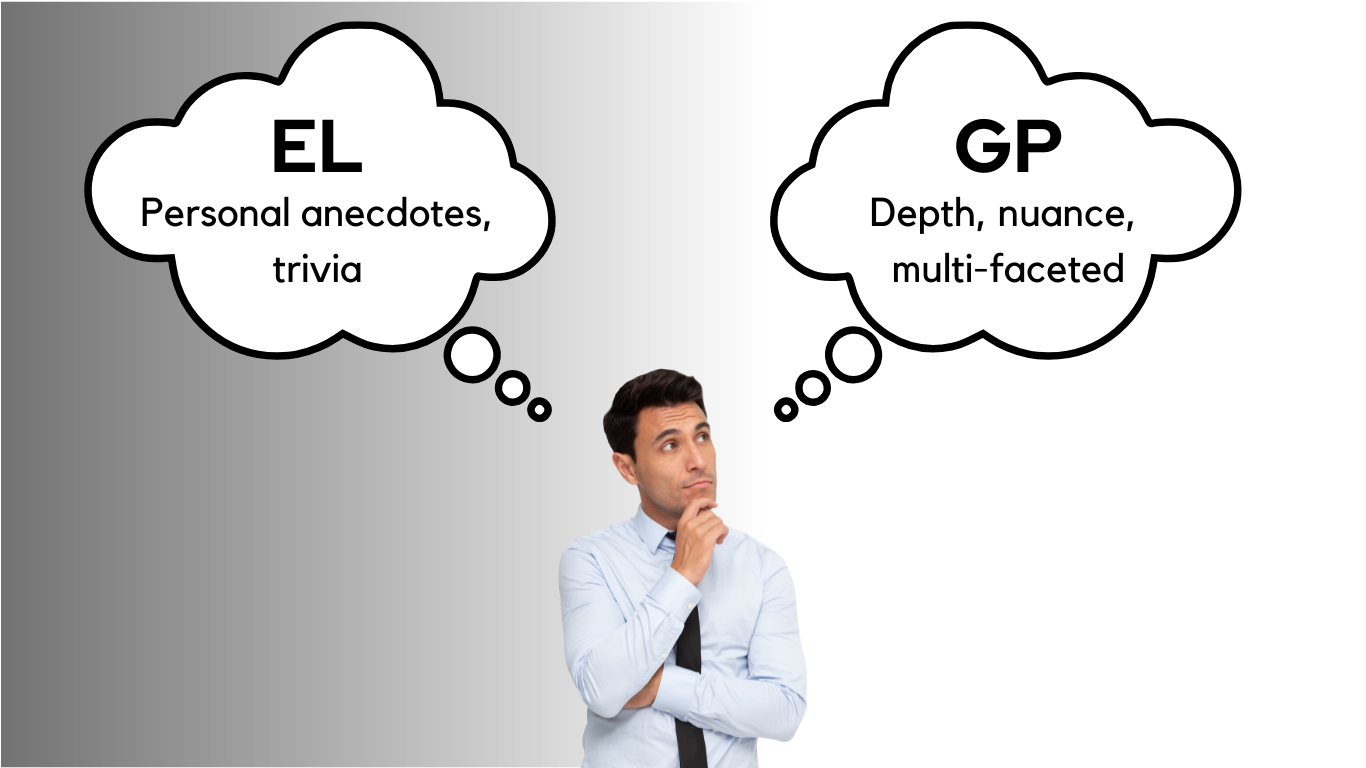What is the problem?
When students first embark on their General Paper (GP) journey, they will likely be shocked by the sudden jump in academic rigour. Specifically, they would likely find it difficult to even have sufficient – let alone more – examples in GP essays. Of course, this is only one issue to which students may struggle to adjust, but we shall discuss other problems in other posts.
When it comes to possessing enough knowledge or even building more examples in GP essays, (or lack thereof) this problem stems from a few reasons.
Reason 1 – Major differences in the types of examples in GP essays and in English essays
As academic rigour increases in the ‘A’ Levels, so do the criteria that determine the viability of the types of examples in GP essays. For some context, in the Argumentative Writing component of the ‘O’ Levels English Language (EL) paper, students are indeed assessed on their ability to craft coherent arguments that directly engage with the question.
However, notwithstanding the recent changes in the new EL syllabus 1184, considerations and rationales underpinning the allocation of marks in EL argumentative essays of old result in a higher prioritisation of language skills rather than soundness of content. This invariably leads to more leeway in terms of the accuracy of examples.
The allowance of unfalsifiable examples, is one such massive consequence. In EL, students were still somewhat allowed to utilise personal anecdotes, trivia and statistics from suspect sources. In addition, while statistics and/or “facts” conjured from the thin air will affect the content marks of students’ essays, they did not detract from the overall key focus of the assessment, which was the assessment of students’ ability to craft beautiful sentences stylised in the appropriate tone and peppered with complex vocabulary.
(I would like to make it clear, however, that this phenomenon is through no fault of their own. Unless there was a deliberate mandate that downplays the importance of examples in teachers’ instructions – which is nigh impossible – this is a problem that seems to be a blind spot in our instruction that was born more so from practical considerations in terms of preparing students for the exams rather than incompetence.)
Furthermore, although the new syllabus of EL represents an increase in the fact-checking rigour, such a paradigm will continue to be pervasive; students and teachers have already been conditioned to believe that knowledge and accuracy of examples becomes secondary. (Pun unintended.)

On the other hand, GP essays require factual examples related to key world events, well-known individuals, or even institutions and grassroots movements. Even the usage of statistics requires students to cite their sources and said sources must be reputable or even peer-reviewed. Since Junior College (JC) constitutes a step prior students’ entry into university, such requirements – which are the basics of basics in academia – are naturally concomitant with JC subjects.
As a result, when students inevitably face having to bring in examples in GP essays as they progress to ‘A’ Levels, they struggle mightily. They would have to play catch-up and voraciously read up on world affairs in order to gain more knowledge and have the necessary examples to improve their GP essays. When they are suddenly tasked to provide real examples in GP essays when they have had four years of not having to be concerned about it, students will inevitably struggle with even having the basic general knowledge to supplement their arguments.
Reason 2 – Higher demands necessitate higher-quality examples in GP essays
Inevitably, as students move on from ‘O’ Levels to ‘A’ Levels, the complexity of the content that makes up the subject and its ancillary syllabus increases. With this comes a much higher demand from the students vis-à-vis their understanding of real-world issues.
Yet, this can be incredibly challenging at this stage of students’ academic careers. While subjects in secondary school such as EL and Humanities can instill some level of critical thinking ability in students, it comes as little to no surprise that the training afforded by secondary school coursework continue to compel students to think about and assess problems in individual silos rather than cogs in a wider machine that can – and must – be considered in context of other issues, institutions and stakeholders.
However, this is not sufficient should we seek to achieve the learning objectives of the subject of General Paper. Examples in GP essays must be relevant and nuanced with the necessary depth of explanation. In short, students need to gain a deeper, multi-perspective, nuanced, and even interdisciplinary understanding of current affairs, which should – when paired with the necessary critical thinking skills to unpack the parameters of each essay question – ideally be seamlessly integrated into their GP essays.
This would perhaps be one of the biggest proverbial wall for students to overcome, so to speak. At this juncture, not only do they have to catch up in terms of building more content knowledge as mentioned, but they also have to understand what is the right example and which particular details are most relevant to their argument.

To take their arguments to the next level, they have to further broaden their examples to touch on other issues that are related to but not directly constituting the subject matter of discussion within the questions. However, we will leave that for another discussion.
Resultantly, in regard to instruction, teachers necessarily need to guide students in gaining (through thorough practice and inquiry) the ability to unpack multi-faceted causes and implications of real-world issues in conjunction with other potentially overlapping issues in society. In short, students do not just require the quantity of examples; they need the quality.
Yet, I should point out that these issues are by no means a detrimental flaw in the system. Rather, this is emblematic of a perpetual debate between the rigours of the syllabuses and students’ readiness in terms of their exposure to such content. Even then, such instruction must still consider student profiles, feasibility of implementing any potential changes and parents’ concerns and perceptions in regard to the difficulty of the subject(s).
Reason 3 – The amount of time required is just inefficient
Now, let’s be clear. I am not asserting that JC students do not have the time to do their schoolwork; if anything, barring any extenuating circumstances, it is expected of them to learn time-management skills to balance their academic work, CCA commitments and other things. No, what I am pointing out, instead, is the amount of time that is required to research salient issues of society and the world in-depth.
Any GP teacher would emphasise the need to consider any material that students read in context. They would also urge students to ask questions and consider the roles of institutions in society, communal responses and/or backlashes, etc., etc. Thus, unpacking any potential examples may result in students attempting to unravel a huge ball of thread.
As a teacher that prepares such materials, the amount of time, thought and effort into the research is truly time-consuming. Even then, sometimes students may still raise questions that you may miss. That is not to say, however, that students should not take ownership of their own learning and entirely depend on teachers; rather, expecting students to be able to do this entirely on their own is just not feasible.

Furthermore, the ages of 17-18 years is a delicate period for students. They will be just beginning to discover themselves and their experiences when exposed to the ups-and-downs of society and “adulting” render them highly impressionable and may even be formative.
Developmentally speaking, this is a period that requires careful guidance and mentorship to begin easing them into the demands of adult life. Resultantly, there is a higher chance of students paying attention to and absorbing misguided or even downright false information which not only harm the quality and accuracy of their examples in GP essays, but may even be harmful in their development as individuals. Of course, again, that is not to say that we treat the students with kid gloves; rather, the materials must be prepared for them and guidance is imperative.
So, what is the solution?
Hitherto this point, if what I have written sounds fatalistic, I apologise. No, if anything, there is a simple solution. Simple, but not necessarily easy. Nevertheless, at its core, this problem requires both the student AND the teacher to work well together to remedy. (The question of how much responsibility both parties should share is debatable, but spoilers: it’s the teacher.)
For the teachers, their understanding of their students’ profiles is critical. Materials have to be pitched at the appropriate levels. Building critical thinking skills can be done while easing students into more general content. When students have reached a certain level of readiness, this may perhaps call for the introduction of more niched content. Really, there is nothing new here to add on that teachers do not already know.
On the part of the students, there must be a yearning to learn. This can be cultivated through engagement. In addition, students need to make a concerted effort to ask questions for the sake of clarification and gaining new knowledge. However, there still exists the inevitable mental association between school work and drudgery; as such, students should instead cultivate a deeper interest in issues that they care about. While General Paper requires much more than a few niched loci of knowledge, interest in a topic can still serve as powerful intrinsic motivation for students to reach out and gain said knowledge.
The Discourse Education helps you build quality examples in GP essays
To help students, The Discourse Education we provide deep and rigorously-researched materials for the subjects that we teach. These materials are of high quality and will definitely suffice for students’ GP essay needs.
Also, do check out our testimonials to see what our ex-students have to say about our services!

